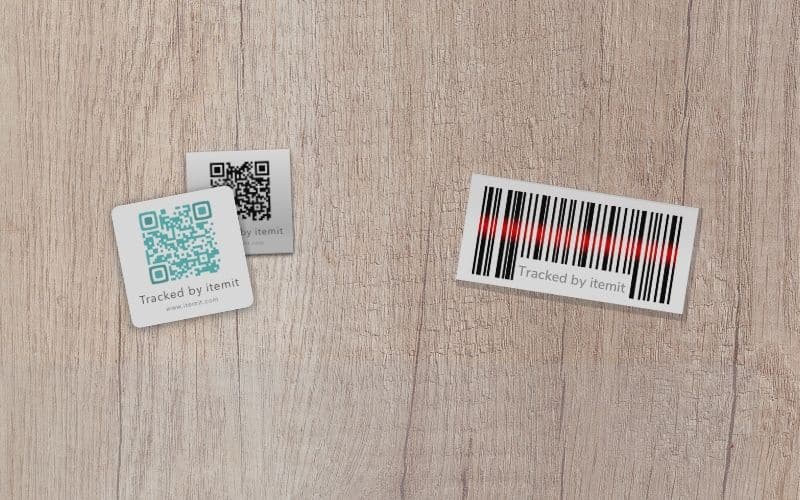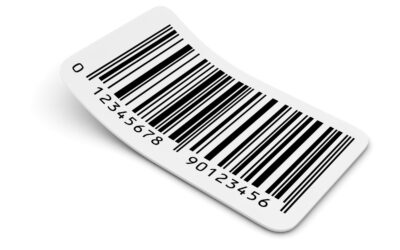Asset tags speed up your asset tracking operations. They integrate with your asset tracking software, allowing you to discover, manage, and edit your asset information with ease.
Generally, you will be able to print off your own asset tags. However, in some situations, you may need to use custom asset tags for more durability. For example, if you’re implementing construction equipment asset tags, you may need tags that have more durability.
Find out more about the ways custom asset tags can improve your asset tracking here.

How Do Asset Tags Work?
Asset tags contain a unique ID that you can link to your assets. As your assets are unique, they must have a unique identifier to be able to link the assets themselves to your asset tracking software.
In other words, each asset will have a unique profile in your asset management system. So, if you’re tracking your IT assets, each laptop will have a unique profile with unique information.
You will then tag your assets with your unique asset labels and link the data, so the physical tags are linked to the corresponding assets. This means that you’ll be able to scan a tag with your asset tracking app to retrieve the asset’s data.
Every time you scan a tag, too, a few things happen:
- The last seen location updates
- The user who scanned the tag is logged
- The time of the scan is logged
- The asset’s profile opens, ready for you to use a range of helpful features
Custom Asset Tag Materials
So long as you can add a readable barcode or QR code to your material, there isn’t much of a limit to the types of material you can use.
So, if you’re tracking tools and equipment and they’re frequently outside, you’ll be able to use anodised aluminium, or metal, QR codes to withstand more weathering.
If you’re tracking costumes or clothes, for example, if you’re a theatre tracking assets, you’ll be able to use iron-on tags which you can conceal inside your clothes.
In some cases, you may even need more out of your asset labels. So, if you’re tracking aerospace assets, you can opt for polymer-based materials or other, heavy-duty tagging options.
With itemit, too, you can use any materials and we’ll be able to consult with you the best tags for the job and order them in for you.
RFID Asset Labels
RFID is a little more complicated. If you’re using an RFID-based asset tracking system, you need to be aware that the tag materials can affect the readability of the tag.
As such, some tags will not work on metal. This is as RFID uses radio frequency signals to interact with your hardware. Therefore, if you’re placing a tag on conductive material, the tag itself cannot conduct any electricity otherwise the components will interact.
Thankfully, there are still many options you can opt for when it comes to RFID labels. There may also be a health and safety element involved. If you’re using RFID to remove the need to get close to your assets, you will be able to couple this need with chemical-resistant RFID labels.
Branding Your Asset Labels
Finally, you can also brand your asset tags. If you’re looking to use them as a deterrent, to indicate that you own an asset, or if you simply wish to add your business’ flair to your asset tracking operations, you will be able to add a logo and text to your asset labels.
You can brand QR codes with colours, too, you will just need to ensure that the colours contrast enough to ensure that your asset tags are still readable.
If you’re looking for custom asset tags, we can help. All you need to do is contact us today at team@itemit.com and let us know what your requirements are and we’ll be able to get you a quote and let you know the finer details.
If you’re looking for better asset tracking operations, you’ll be able to start a free trial of the itemit software by starting a free trial. All you need to do is fill in the form below!
Custom Asset Tags
Choose a better way to track your assets
Start your free 14-day trial now
Instant access. No credit card details required.
Related articles
Everything You Need to Know About 2D Barcodes
Discover everything about 2D barcodes, including how they work, their benefits, and how they are revolutionizing industries and improving business operations
Complete Guide to Asset Lifecycle Management and Its Benefits
Learn about asset lifecycle management and how it helps businesses optimize asset usage, reduce costs, and improve efficiency throughout the asset’s life.
Benefits of Vendor Managed Inventory for Your Business
Learn how Vendor Managed Inventory (VMI) can streamline your supply chain. Explore the key benefits and how it helps optimize inventory management.




